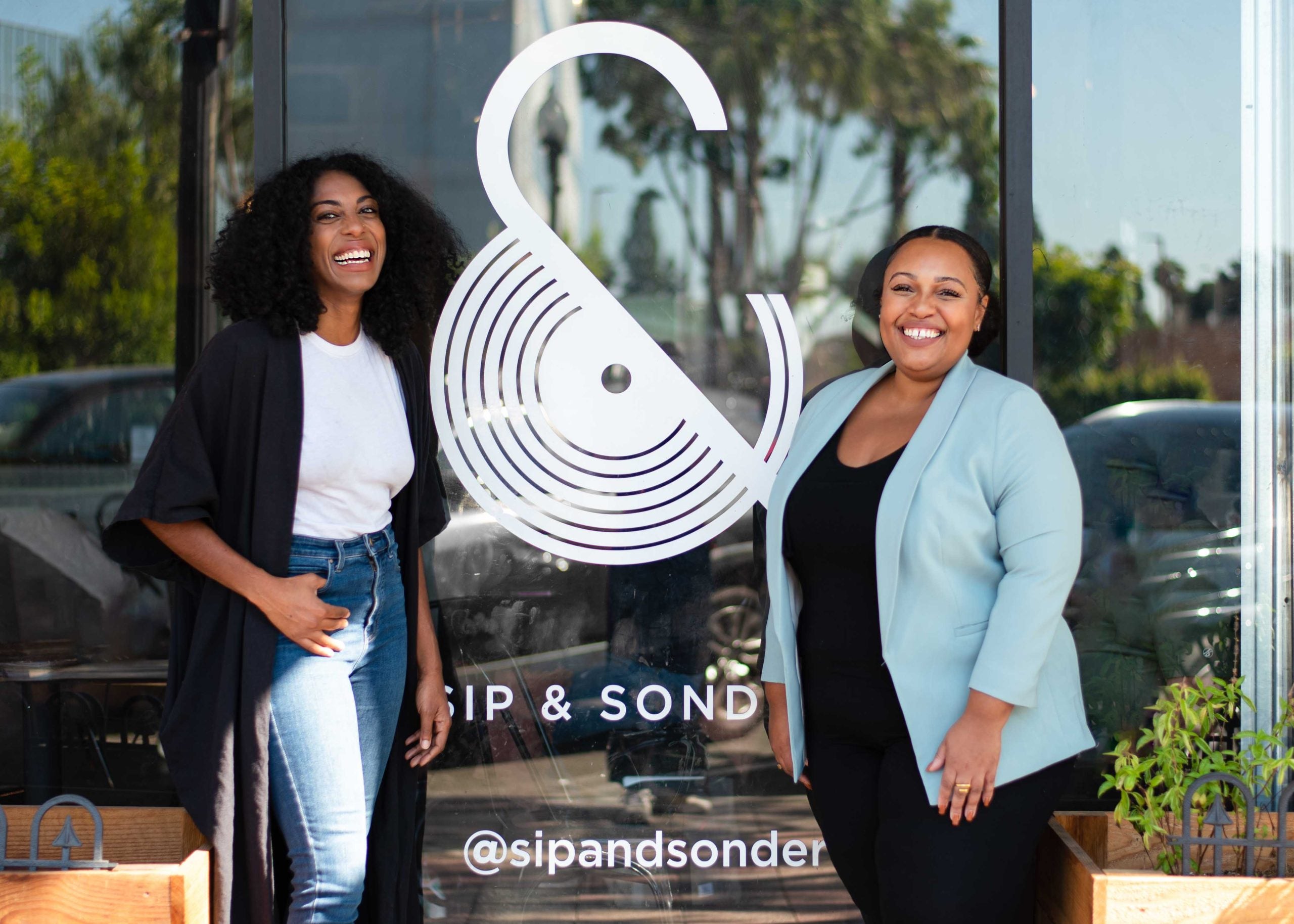How do you take your coffee? Some like it with cream and sugar, others prefer it bold and Black. However it’s brewed, coffee has long been a source of comfort, connection, and a little boost to get through the day.
For Amanda-Jane Thomas and Shanita Nicholas, that boost became something bigger. What began as a friendship inside a New York City law firm transformed into a shared mission: to build a space where coffee, culture, and community collide. In 2017, they launched Sip & Sonder, a coffee brand and roastery in Inglewood, California, grounded in purpose, Black joy, and wellness. They’ve since expanded to two other locations, including in downtown Los Angeles, and in the downtown Disney District in Anaheim.
At Sip & Sonder, coffee isn’t just a product. Rather, it’s a vehicle for collective care, creativity, and community healing. By centering values over profit, Thomas and Nicholas are showing that when passion drives business, everyone wins. We spoke with the duo to talk about the role of wellness in entrepreneurship and why building with intention matters.
ESSENCE: How was it transitioning from law to the coffee industry?
Amanda-Jane Thomas: I think it was very much like jumping or diving into an unknown headfirst. I previously worked in corporate America in media and entertainment law, so I know a lot of things. But I think that when it comes to starting your own business, there’s only so much preparation you can do. And when you’re in it, you realize how much you still don’t know. But that’s okay because you know one of the things we like to say on repeat is “You don’t know what you don’t know,” right? So, just use everything that is within your toolbox, your toolbox of skills, and really lean on that happily. My mom called it when I was around seven and said I should be an entrepreneur. I didn’t know what she meant at the time, but after she explained it, I noted that.
And now, fast forward, taking that step became real. For any entrepreneur in whatever respective field or industry, it’s important to lean on your skillsets, passions, and a healthy amount of learning on the way.
What is a core principle for Sip & Sonder that is rooted in your personal values?
Thomas: Our core principle for Sip & Sonder is joy, specifically Black joy, in any space that we curate. We’re also a coffee manufacturer, so all the coffee we sell at our locations is produced from sourcing and importing it, roasting it, and then getting it out to the world.
Joy is resistance. And for us, there’s alignment in how we, through coffee, move through the world. Coffee is our golden child, so we want to be able to spread joy through it. Think about it: when you’re having a cup of coffee, whether or not you drink coffee every day or once in a while, it’s really about you taking a moment for yourself. We recognize the value of the beautiful moments that can arise from taking a moment to connect inward or with others, often beginning with a simple cup.
How do you incorporate intentionality in your ingredients and into Sip & Sonder as a Black woman business owner?
Shanita Nicholas: The interconnectedness that Sip & Sonder upholds has been very important to us. I think we have done a beautiful job incorporating that into our ethos and spreading it across the company in really meaningful ways. Similar to relationship building. For example, when we are seeking an importer or meeting a new producer, we ask certain questions. Can we meet the farmers? Do you have the story? Are you aware of any other projects that are happening within that community? Is there a women’s group? Of course, we ask other questions, but these are the things that make a quality cup and can score well from a quality perspective.
From a business perspective, truthfully, I am fortunate that I don’t have a huge separation between my personal and professional selves. When we worked in the corporate world, we needed to do that. But with Sip & Sonder, I have intentionally created spaces where people do not have to worry about whether they show up authentically because that is part of our brand—authenticity with our partners and with our teams. Sip & Sonder isn’t a place where people have to worry about how they represent themselves, or there’s a made-up idea of who you are supposed to be versus who you are. I believe this is a significant distinction that sets us apart as business owners, thanks to a system and culture that fosters open communication, growth opportunities, and the ability to learn and make a bigger impact every day.
As you continue to grow Sip & Sonder, do you see wellness becoming a significant aspect of other businesses’ models?
Thomas: Absolutely. We have Sip & Sonder, and we have lots of other passions in our lives that speak to different parts of ourselves. And none of that matters if we’re not okay, right? For example, we also have a nonprofit called Sonder Impact. It’s our 501(c)(3) nonprofit affiliate of Sip & Sonder, where we do a lot of our impact programming through. There are two umbrellas. There’s an entrepreneurship umbrella, which is really about capacity building within Black communities, and then we have an umbrella focused on a well-being initiative. We center around the true sense of every aspect of well-being, such as social, emotional, physical, mental, environmental, and financial. So, to your question, the answer is yes because that is something that means so much to us. Anything that we create is imbued with a founder’s personal desires, preferences, values, etc.
Nicholas: Continuing in that line of thought, when it comes to business, you have to think about the sustainability piece. So, when you incorporate values into the ethos, you create a company that reflects who you are. For Sip & Sonder and Sonder Impact, we actively make that a goal of ours. It is less about making the company separate from who we are as individuals. The company itself is an overarching ecosystem that we both created and want to live within.
What would you say is an essential formula that Black women should follow when it comes to following their passions?
Nicholas: I think one thing that was part of the reason that we came together and that we work so well together is that we dream really big. I know there’s the saying, ‘Reach for the stars, land on the moon.’ But for me, I say reach for the Milky Way.
Thomas: On top of dreaming big, I think you have to make sure that you are surrounding yourself with people who will help you hold those dreams because they’re fragile. So when you pour into those dreams, you have what you need to execute them. Because we know that within a community, there is energy that transfers. That’s not just in your personal life, right? So I would encourage women to be really particular about their tribe. And part of that, both with your tribe and in your choices and decisions, is listening to that voice.







